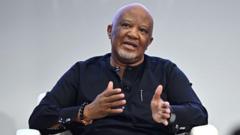Mark Zuckerberg's recent comments about redefining corporate culture at Meta underscore a controversial shift toward emphasizing "masculine energy" and removing conventional diversity programs, sparking widespread debate about the future workplace dynamics and its implications for inclusivity.
Zuckerberg Shifts Meta’s Focus Towards “Masculine Energy” and Cultural Balance

Zuckerberg Shifts Meta’s Focus Towards “Masculine Energy” and Cultural Balance
In a controversial pivot, Meta CEO Mark Zuckerberg emphasizes a balanced corporate culture by embracing “masculine energy,” while stepping away from traditional DEI initiatives.
Meta's CEO Mark Zuckerberg has announced a significant change in the way his company approaches corporate culture, moving away from traditional diversity, equity, and inclusion (DEI) programs toward fostering what he describes as "masculine energy." In an interview with Joe Rogan, Zuckerberg articulated the need for a workplace environment that balances masculine and feminine energy, stating, “A lot of the corporate world is pretty culturally neutered.”
While acknowledging the importance of supporting women in the workplace, Zuckerberg criticized the contemporary stance that views masculinity negatively, asserting that such a perspective has led to detrimental effects on corporate culture. He called for a fresh approach that celebrates both masculine and feminine qualities, arguing that embracing "a bit more aggression" could stimulate innovation and competitiveness within Meta.
This perspective has manifested in tangible policy changes at Meta, such as the decision to eliminate tampons from men's restrooms, a measure previously introduced to support nonbinary and transgender employees. Furthermore, an internal memo disclosed that Meta is officially discontinuing its DEI initiatives, acknowledging that the concept of DEI has become “charged” and often interpreted as favoring specific groups. The company aims to pursue fairness and inclusivity without employing divisive frameworks.
In addition to the cultural shifts, Zuckerberg's announcement comes alongside the discontinuation of Meta’s fact-checking program, believed to be influenced by concerns regarding political bias among fact-checkers. This development reflects a broader strategy of regaining control over policy decisions and addressing criticisms of Meta's content moderation practices.
These policy alterations have emerged following Zuckerberg's positive meeting with President Donald Trump, a gathering that hinted at a potential new direction for Meta. When questioned about the political implications of these changes, Zuckerberg firmly asserted that the decisions are driven by a long-term vision for a more competitive corporate environment rather than immediate political motivations.
He emphasized the importance of nurturing a work environment that is welcoming yet does not vilify masculinity: “It’s one thing to say we want to be welcoming… but another to say that ‘masculinity is bad.'” Zuckerberg's strategy has ignited a debate across various industries as the implications of these changes unfold. As Meta embarks on this new journey, the responses from employees, users, and the broader technology sector remain to be seen.




















